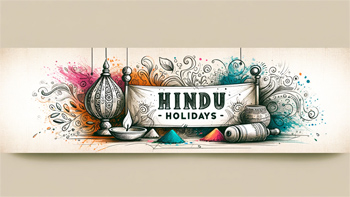Hinduism, one of the world's oldest religions, is celebrated through a myriad of vibrant and spiritually significant holidays. These festivals reflect the rich tapestry of Hindu mythology, traditions, and values. They offer a unique blend of solemnity, jubilation, and profound meaning, deeply embedded in the culture and daily lives of Hindus. This extensive article delves into the most prominent Hindu holidays, exploring their historical origins, customs, and the underlying messages they convey.
Diwali: The Festival of Lights
Diwali, perhaps the most renowned Hindu festival, symbolizes the triumph of light over darkness and good over evil. Celebrated over five days, it marks the return of Lord Rama to Ayodhya after defeating Ravana, as narrated in the epic Ramayana. Homes and streets are adorned with lamps and rangoli, and fireworks light up the sky. The festival is also a time for family reunions, sharing sweets, and the worship of Lakshmi, the goddess of wealth and prosperity.
Holi: The Festival of Colors
Holi, known as the Festival of Colors, celebrates the arrival of spring and the victory of good over evil. It is associated with the legend of Prahlad and Holika and represents the triumph of devotion over malice. Holi is famously marked by the playful throwing of colored powders and water, symbolizing the vibrant hues of spring. The festival fosters a spirit of forgiveness, friendship, and the rejuvenation of relationships.
Navaratri, Durga Puja, and Dussehra
Navaratri, a nine-night festival, celebrates the divine feminine, primarily in the forms of Goddesses Durga, Lakshmi, and Saraswati. Each goddess is worshipped for three nights, symbolizing power, wealth, and knowledge, respectively. In eastern India, the festival culminates in Durga Puja, commemorating Goddess Durga's victory over the buffalo demon Mahishasura. The tenth day, known as Dussehra, marks Lord Rama's victory over Ravana and is celebrated with the burning of Ravana's effigies.
Janmashtami: The Birth of Lord Krishna
Janmashtami celebrates the birth of Lord Krishna, an avatar of Vishnu. Devotees observe a fast, sing devotional songs, and enact the events of Krishna's early life. The highlight is the 'Dahi Handi' ceremony, where teams form human pyramids to break a pot of yogurt, symbolizing Krishna's playful and mischievous side. Janmashtami brings to life the profound teachings of the Bhagavad Gita and Krishna's role in the Mahabharata.
Maha Shivaratri: The Great Night of Shiva
Maha Shivaratri, the 'Great Night of Shiva', is a solemn festival honoring Lord Shiva. Devotees observe fasting, chant mantras, and offer prayers throughout the night, symbolizing the overcoming of darkness and ignorance. It commemorates various events in Shiva's life, including his marriage to Parvati and his performance of the Tandava dance. The festival is a reflection of deep spiritual introspection and reverence.
Ganesh Chaturthi: Celebrating the Elephant-Headed God
Ganesh Chaturthi marks the birth of Lord Ganesha, the elephant-headed god of wisdom and prosperity. The festival involves the installation of Ganesha clay idols in homes and public pandals. For ten days, these idols are worshipped with prayers, music, and dance. The festival concludes with the immersion of the idols in water, symbolizing Ganesha's return to his celestial abode and the removal of obstacles from the lives of devotees.
Raksha Bandhan: The Bond of Protection
Raksha Bandhan celebrates the bond between brothers and sisters. On this day, sisters tie a rakhi (a sacred thread) on their brothers' wrists, symbolizing love and the promise of protection. The festival strengthens family ties and upholds the values of care and respect within the family structure. It is a day for sharing gifts and sweets, and reaffirming the bonds of kinship.
Pongal: The Harvest Festival
Pongal, a four-day harvest festival, is predominantly celebrated in South India. It coincides with the Tamil solar calendar's first day and is a time for giving thanks to nature, the sun, and farm animals for providing the essentials of life. Festivities include cooking the Pongal dish (a sweet rice pudding), decorating homes, and participating in traditional games and dances. Pongal embodies the spirit of gratitude and the joy of life's renewal.
Hindu holidays and festivals, with their diverse and profound significances, play a vital role in preserving and celebrating the rich cultural and spiritual heritage of Hinduism. They foster a sense of community, reinforce moral values, and offer moments for joyous celebration as well as contemplative spirituality. Through these festivals, Hindus across the world connect with their ancient traditions and find meaning and joy in the rhythm of their religious calendar.
